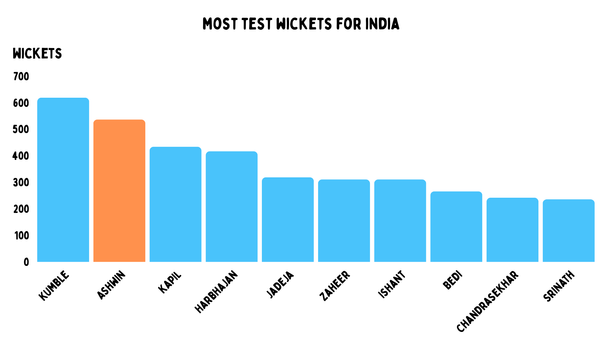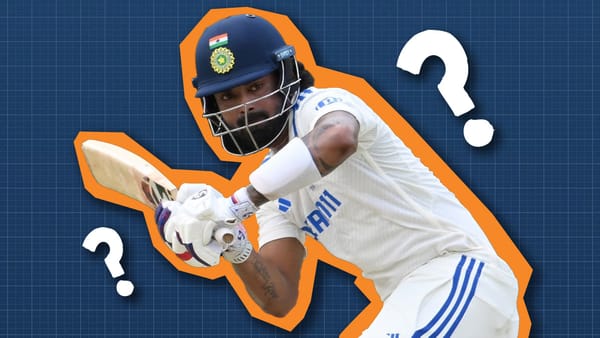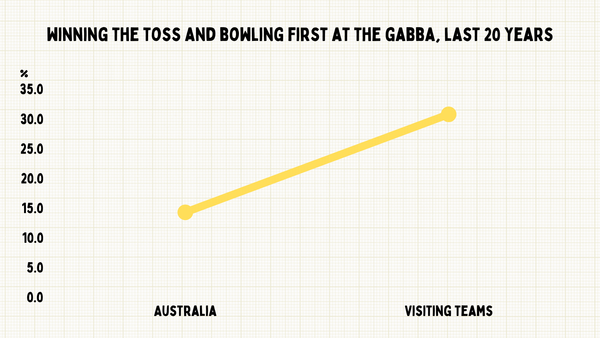My time with ABC Grandstand
Gerard Whateley has just stepped down from the ABC, this is a piece on my time consulting with the ABC on how to build a better cricket…
Gerard Whateley has just stepped down from the ABC, this is a piece on my time consulting with the ABC on how to build a better cricket commentary show.
To my left was Ian Chappell, Sunil Gavaskar, and Glenn McGrath, and here I was, a complete nobody, about to do the same thing as them, commentate on the cricket for ABC Grandstand. The soundtrack to my summers, and not just at any ground, but the ground I grew up at, the MCG. It’s doubtful anything I said in the first few minutes at all.
I had never thought I would become a commentator, that wasn’t part of my plans, let alone dreams, I hadn’t played top-level cricket, and most of my commentary experience was amateur for Test Match Sofa. But after appearing with Jim Maxwell on a BBC Ashes quiz, Jim had asked me to consider being a commentator, and ended up bringing me along to commentate Australia’s 13/14 tour of South Africa. And I loved every second of it.
But by the time I was back in Melbourne to commentate, it was pretty clear that ABC Grandstand’s cricket coverage was a basket case. Kerry O’Keefe would be gone by the end of the summer, Peter Roebuck’s void had never been filled, neither had Glenn Mitchell’s departure. If you wanted to go back, they’d never replaced Tim Lane. So the great team they had in the late 90s was gone. Instead, they were trying to fill it up by bringing back people like Drew Morphett, who was pretty much already at retirement age. And they tried every single former (and a few current) player they could that summer on air. If my memory is right, they had Jamie Cox, Andy Bichel, Terry Alderman, Geoff Lawson, Ed Cowan and Trent Copeland commentating at different times.
On top of this, they had this weird position that Cate McGregor and I were job sharing. When I arrived for the first Test I wasn’t even sure what my role was supposed to be, or if I was needed. It turned out the role was talking through what the press were saying about the cricket, in the 15 minutes before play, and then doing the same thing for five or ten minutes at the end of lunch and tea. For those 30/40 minutes, I’d be paid a full rate. And I was pretty unqualified to do it, as I don’t care what other journos are saying most of the time, and I don’t write cricket news (neither does Cate), I write analysis and features.
That didn’t seem to matter, someone, somewhere, had decided that they needed to bring in a journalist (they had trialled replacements for Roebuck before) and this was our role. Cate did the first two Tests; I did the next two. Maxwell seemed annoyed by our lack of minutes, so he’d keep me on to commentate with him, which then got awkward in the small boxes.
Other than the actual audio production side of the show, which seemed to be high quality, the entire show was a shambles. So I decided to email to Mark Scott, the head of the ABC at the time.
It was a bit of a rant, because I was so frustrated, and it contained lines like this, “I say as a listener, a commentator, and that weird newsy part-time role I played this summer, something must be done. The commentary is stale. The leadership is non-existent. It’s zombie coverage. And I genuinely fear for the relevance and quality of the broadcast.”
I was frustrated, angry, and while it probably wasn’t the smartest move from someone who was now on the inside of grandstand, I cared more about the show than staying a part of it. It should be pointed out that I haven’t commentated a ball for grandstand since sending the email, although, as I’m about to show, there are many reasons for that.
To my surprise, Mark Scott got back to me on the same day and said our views aligned with many of the points I raised. It was a short reply; I wasn’t sure what to make of it.
A few weeks later I was contacted by Michael Mason, the ABC’s director of radio, who said he wanted to meet up and talk about my email. During a World Cup match I went out the back of the SCG press box and chatted with him for about half an hour or so. I figured they just wanted to hear from someone who was passionate about cricket commentary, so I went through all the things that I thought were poor about the current set up, and all the things they could do to change it. About 20 minutes in, Michael looked at me with a weird facial expression, and said something along the lines of, who the hell are you, and where did you come from. So I spend the next few minutes explaining that, and he seems far more interested in me, than my ideas. And he tells me why, he’d like me to come on and be a consultant in the reshaping of the Grandstand team. I said yes.
After meeting Mason, I met with Jeremy Millar, who was the manager of metropolitan radio. His email asked me to prepare some key points:
- The state of our current commentary position
- Options for where we might take it
- Possible talent renewal
- Any other observations around our approach to Cricket
I met with Millar just over a month after my rant to Mark Scott, and it was a good meeting. It was the first time I realised how obsessed they were with Gerard Whateley; they saw Whateley as the missing link, the man who would come in and solve all their problems. I was pretty clear that although Whateley should be a step in the right direction, their problems were more fundamentally than just not having a new leading voice as Maxwell slipped into retirement. They didn’t have a team, their social media presence was black and white, they weren’t known for anything, and Fairfax might have started poorly with their commentating, but they would eventually get it right.
And also, they hadn’t thought about who Whateley was, to them he was this golden broadcaster who fit the ABC perfectly. But he’s also Mr Footy; he hosts a TV show four nights a week during the season, cricket goes on during the foot season. And the most important tour, the Ashes, there is a real chance that Whateley would not want to do it. It was pretty clear from the response that they hadn’t even thought of that, nor had they talked to Whateley about it. With Maxwell getting on (he’d suffer a stroke later that year), and Whateley perhaps not always wanting to tour, it would mean that they had no one to carry their load from there on in for Ashes, World Cups, World T20s, all of which can clash with footy season.
Millar asked me to come on as a consultant and start writing a roadmap on how they can improve the show. Eventually, they would want me to spend a few months in Sydney or Melbourne working in their offices before the 2015 AShes to make sure they had a great product for that. I wrote my first report, and I was told to send it to four people, Millar, Mason, Justin Holdforth (I think head of ABC TV sport) and one other person who I have now forgotten. The problem was apparent just by this; no one was in charge of this show, everyone had a say.
And that was truer when you looked at the running of the show. To me their biggest problem wasn’t the lead commentators, it was that no one was in charge. When I started commentating for them a year earlier, Craig Norenbergs was nominally in charge, but he had moved on, his position wasn’t filled that I was aware of. Ned Hall was the producer of the show, but he also didn’t seem to have any power. No one else was in charge at all, and everyone agreed there should be a change.
They kept telling me I’d be coming out soon, so I left a huge blank spot in my calendar, they were having a big meeting with all the stakeholders, producers, managers, commentators, executives, everyone would be there. After months of telling me I’d be coming out, they ran out of time, they had the meeting without me, and decided to implement some of my ideas. Mostly around the commentary team itself, I had told them to focus on recently retired smart players who had lives outside the game. Ricky Ponting was who I thought they should aim for, even though it was a long shot, but I also had Simon Katich and Ed Cowan on my shortlist, and a long list that I think included people like Dirk Nannes. Mel Jones was someone I thought was an obvious person to get involved.
But here was the part I thought was important, these people had to be trained. To think that a few sweaty press conferences and milk ads prepare for your hours and hours of cricket commentary is insane. These guys trained their bodies and minds for years to become the best cricketers they can be, they are paired with broadcasters who have spent years on their craft, and the formers players are suddenly supposed to be master communicators to a mass audience overnight. It’s stupid. They should be trained on how to broadcast, to communicate, to tell stories. Cricket commentary is a hybrid of sports and late night talk show; you aren’t just reacting to people chasing a ball, you need real skills to handle dull periods of play. And from my experience in the media, what I saw, again and again, was someone hiring some former player because they thought they’d be good, and then letting them flounder around before never hiring them again and not telling them why.
All this comes down to leadership. I suggested a director of the show, someone who wasn’t involved in making sure the show went out to air and sounded good, but made sure every commentator was learning and getting better. The show was talking about the crucial issues, research available on every player, pushing forward with new content (radio and online), and being relevant to Australian cricket fans. The best commentators always told me that they got honest and brutal feedback for their work, and that is how they got better. So that is what I wanted to create, a system of education, learning and like everyone felt like they knew where they were.
Instead the ABC went towards hiring the kind of players I wanted, and put all their trust is Gerard Whateley. A man who seems at any one time to be broadcasting on three separate channels. I understand why they think Whateley is a quality commentator, but he can’t be on air at all times, and without production or directing powers, or anyone to even report too, he can’t do that much. Their belief in Whateley was so absolute; I started to wonder if he had superpowers.
At the same time they seemed to have no other succession plan (something I mentioned a lot). The crew of Quentin Hull, Alister Nicholson, Peter Newlinds and many others like them seemed caught in a holding pattern. None are seen as cricket specialists, I assume they’d all love to be permanent cricket commentators, but the ABC doesn’t seem to push them, happily keeping them all as floating people who then aren’t seen as the next leading cricket commentators. Then there was Adam Collins and Geoff Lemon, who there did seem to be some buzz around, but because they weren’t employees they weren’t part of the team building either. It was Gerard Whateley and then daylight in their thinking.
For the 2015 Ashes, I was to come up with a plan for their social media, which I did. But it couldn’t be followed as they didn’t have the structure to implement it. At times they seemed to have one person in charge of social media for sport, and also the only person doing any work for it. They were supposed to have a podcast which I had pushed them to try, and on the day I walked to Cardiff for the first Test, Geoff Lemon who’d been staying with me and had made the podcast, had to call Millar to try to get them to put the first episode online. This was a big part of the problem, someone like Millar, who I found to be very smart and competent, shouldn’t be involved in commissioning a podcast, let alone be there to make sure it goes online.
The 2015 Ashes were slightly better for social media, but not enough to be considered good. During one of my chats with another ABC employee, it was clear that the higher-ups were now obsessed with the BBC’s pint-sized ashes social media videos, which was an animated commentary. It was a good idea, but for the ABC that still had almost Myspace era social media, it was learning how to run when you hadn’t yet developed legs.
I sent in my final invoice and Millar thanked me for all the videos I had made. He’d confused me with Geoff Lemon. Then when he remembered who I was, he asked me for straight talking about how I thought they’d done. I could tell from the tone of his email he thought they’d done very well. I was pretty blunt with my assessment; I haven’t heard from an ABC executive since.
That summer instead of making a huge deal about their new commentary team, signing them early, and making a splash as I had suggested, they apologetically announced them at the last minute. They never paid for the pint-sized ashes idea as far as I can tell, their commentary got better, but they still lack direction, purpose and leadership. From a distance, it has all been about getting Gerard Whateley in, and now, less than three years after he started commentating cricket, Whateley is leaving the ABC. They are once again saviourless.
For me there was a time when Grandstand’s cricket coverage was the pinnacle of cricket commentary in the world. It educated you made you feel for the game and was the very best of Australia. That is what it should be; Triple M is comedians and Bantz, Fairfax is still old men who don’t add much other than their names and Channel Nine is still terrible broadcasters telling dad jokes while hanging on to old men like they hold the cure for cancer. The ABC should still be the best commentary in Australia, and it should be more than that if done correctly.
The ABC should see Whateley leaving as a chance for complete reinvention. They should make it more professional, push the game forward, to speak again as the voice of cricket in Australia. This is more than just being cricket on the radio; this is part of our heritage. Cricket and radio grew together in Australia, for me the ABC should be making the best show they can, ordinary is not good enough.
The Australian cricket team’s aim is always to be number one, it’s about time the ABC tried the same.


